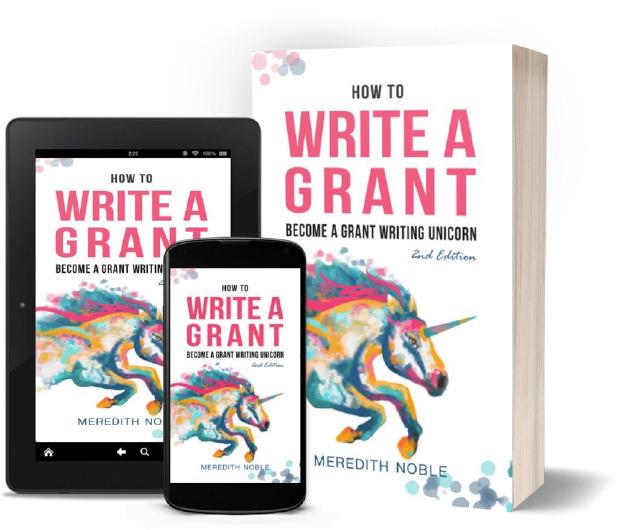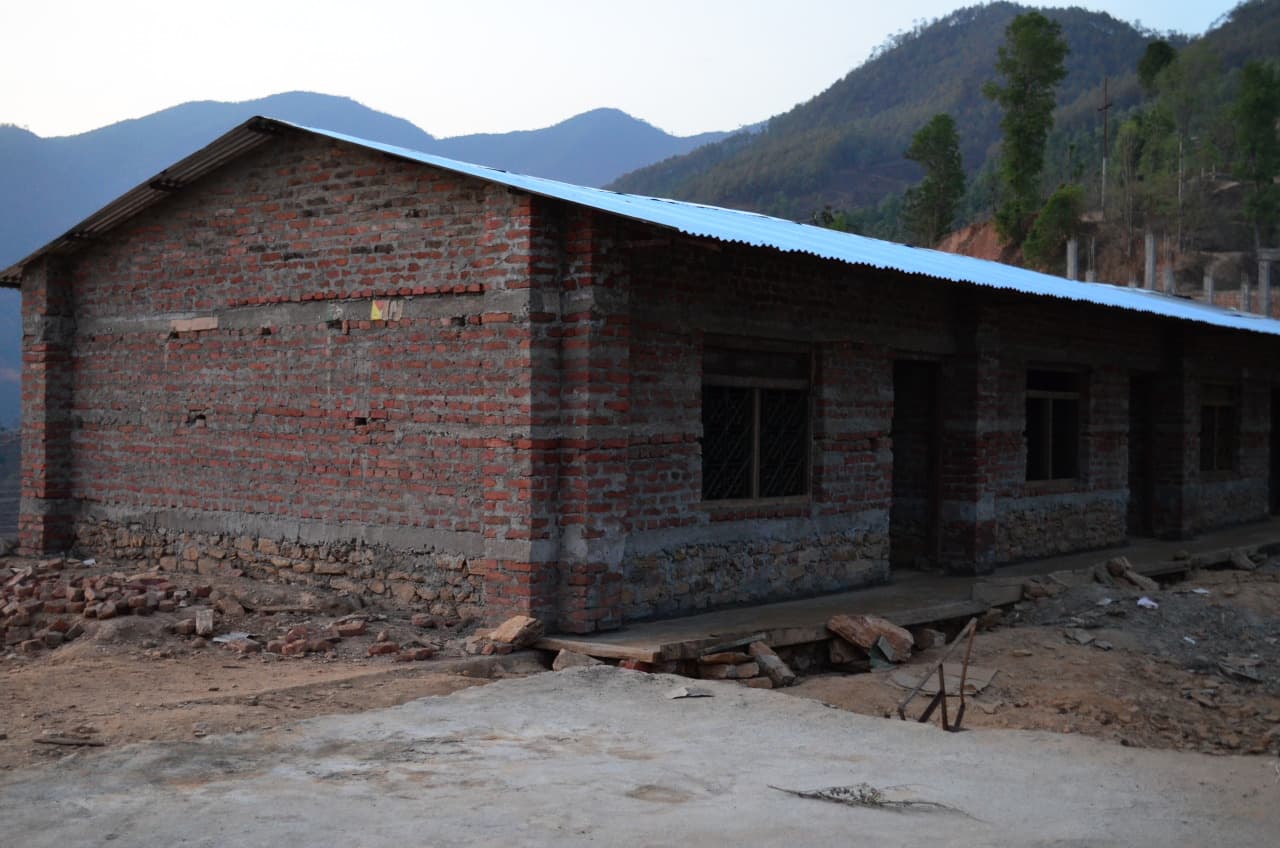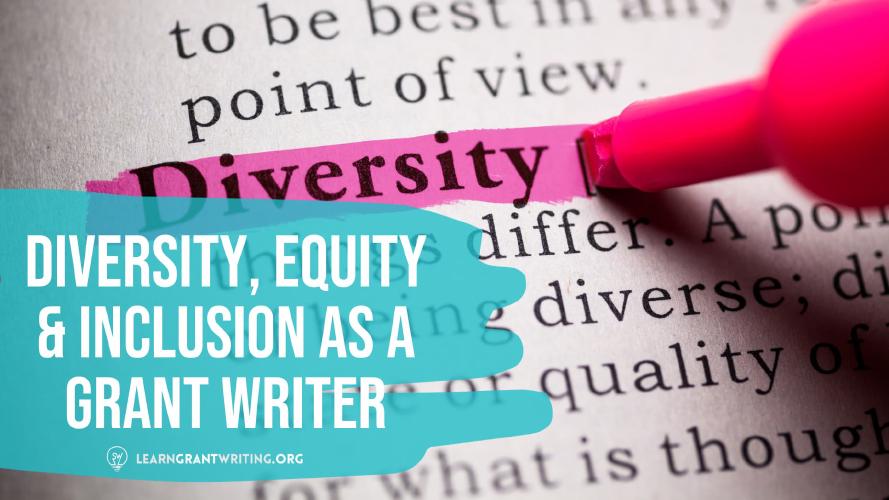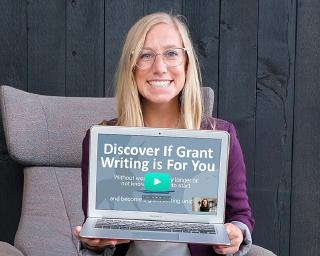Why Focus On DEI As a Grant Writer?
When I pursued my master’s degree in International Human Rights, I spent three months as a “voluntourist” in Nepal. Every time a new volunteer came to the nonprofit I was working for, they adapted their project at one of the local schools to match what the volunteer wanted to do. Every. Time.
The nonprofit was listening to the needs of the volunteer instead of the needs of the community. I do not blame the nonprofit: I attribute it to conscious and unconscious racism and colonialism. As the U.S. fiscal sponsor and as volunteers, we continued a narrative that put our needs first. Using today’s language, we were not antiracists, even though we had moments of antiracist behavior and our intentions were “good.”
A question grant writers should ask is: how do I confront and unpack my own [racism, sexism, classism, saviorism, colonialism, religious prejudice, heteronormativism... to name a few] so that my work has a positive impact?
I am Not Racist Versus I am Antiracist
There is a difference between saying, “I am not racist” versus saying “I am antiracist.” As Ibram X. Kendi describes in How To Be An Antiracist, the problem with being “not racist” is that it is “a claim that signifies neutrality: “I am not a racist, but neither am I aggressively against racism.” Being antiracist acknowledges that there is racism in all of us and in the systems of our society and that you are actively doing something about it. A critical part of being an antiracist is learning about the impact of policies and the history behind those policies. It is important to note that “racist” and “antiracist” are not permanent tattoos—they are “peelable name tags that are placed and replaced” depending on the action at the moment.
As grant writers, we are often faced with community problems that are a result of policies. Undertaking a journey to understand history, institutional racism, and how both are interwoven with today’s societal problems will make us infinitely better community partners and grant writers.
Why Do You Want to Become a Grant Writer?
It is important that, as grant writers, we have our eyes wide open to our blind spots. We enter this field to do good. Meredith and I have data from over a thousand grant writers discussing motivations for getting into grant writing. The majority come to this space because they want to make the world a better place. They want a meaningful career—one they can be proud of. It is exactly why we are here: because we want to leave the world better than when we found it.
Let us celebrate that we arrive in this space heart-led! Let us also celebrate the process of unpacking our motivation to serve in order to ensure that the communities we work with are always at the center of the work.
In other words, we work on checking our own egos at the door and prioritize the skills, expertise, and stories of those we are serving. To do so without harm requires introspection, a commitment to learning, and the ability to implement what we learn.
In this post, you will find that we lean on our thought leaders. There are many incredible people who can educate you about this subject far better than I can. We offer this to you with vulnerability, humility, and with deep respect for the people who are teaching us.
Unpacking Your Motivation to be a Grant Writer: Calling Out White Saviorism
Although my intentions were good when I volunteered in Nepal, the ripple effects of my actions as a volunteer had real, potentially harmful, consequences.
White saviorism is one of many mindsets that can show up when reflecting on our inner motivations to be grant writers. We decided to write about white saviorism specifically because Meredith and I identify as white, so we have experience unpacking our own white savior complex.
Trudi Lebron and Louiza “Weeze” Doran host a podcast called That’s Not How That Works where they explore how diversity, inclusion, and equity show up (or do not) in personal and professional communities. Through their podcast, they shared white saviorism as “the condition where white people go in... to communities, into situations, into places, where they are trying to ‘do good’... and they center themselves in it.” [Episode 87 - “White Saviorism: Final Answer”]
We are also calling out white saviorism specifically because it can appear when people, regardless of how they identify, operate from the white-centered perspective or a white-leaning perspective. As Trudi and Weeze point out, this happens because that is what has been normalized. White saviorism comes into play when:
“The person who is coming to do the saving believes this community needs, without actually having talked to the community, asked the community, been informed by the community, and is always rooted in ego, and pride, and… how it will benefit that Person.” [Episode 87 - “White Saviorism: Final Answer”]
We will start by unpacking our internal motivations through reflection.
We subscribe to adrienne maree brown’s philosophy of emergent strategy. Emergent strategy is how we intentionally change in ways that grow our capacity to embody the just and liberated worlds we long for. Growing this capacity can happen through self and/or group reflection.
P.S. Did you know this information and a fabulous chapter on Human-Centered Design is in our new book? If you want your own copy, you can grab it at the link below.
Grant Writing Unicorn Book
#1 bestseller on Amazon for nonprofit fundraising and grants. Do you have a copy of, “How to Write a Grant: Become a Grant Writing Unicorn”?
Get a Copy Now
DEI Resources
Whether we are freelance grant writers or employees in the nonprofit sector, having diversity, equity & inclusion (DEI) resources is critical. Below we outline some of the DEI resources that have been helpful to us.
Start with Self Reflection
A baseline question could be, does my motivation to “do good” come from a place of wanting to save a community from the pain or problem they are experiencing? The answer to that question might require unpacking the motivations with more specificity. For example:
- How does my motivation to “do good” interfere with my ability to help receive funding for the community I am working with?
- What are my current beliefs about this problem, and how do those beliefs impact my ability to listen and learn from the community?
- How does the fact that I need to make a living by writing this grant impact how I show up for the work?
- How does my need to share my knowledge impact my work?
We have pulled some other questions specific to the grant writing space that we believe are powerful for introspection from Dr. Zosha Stuckey, a professor at Towson University in Baltimore and creator of the G.I.V.E. program (Grantwriting In Valued Environments):
- “What is my place in the world of philanthropy? What motivates me?
- How can I become a fuller human being, more actively antiracist, a more engaged citizen, and a better writer?
- How can I assist without imposing? What is at the essence of writing for versus with?” [Grantwriting Infrastructure for Grassroots Nonprofits].
Here is one more prompt for you as you journal your thoughts. Nikkita Oliver, organizer, educator, lawyer, and poet invites us to ask: How do we acknowledge our multiple identities, both the ones we claim and the ones that have been put onto us?
We believe strongly in vulnerability, so I will share my own self-reflection. Because I was pursuing a master’s degree, I had done a ton of research to ensure that my partner and I would not be voluntourists when we selected the organizations to work for in Nepal, and later in India. I met with the Executive Director of the fiscal sponsor and felt confident that we were providing needed work to the communities in Nepal.
We were devastated when we found out that by helping to rebuild a school that was destroyed in the earthquake a year prior, we were taking away jobs from local construction workers. While our relationships with the local people in that community will forever hold a piece of my heart, we did not feel it was worth taking jobs away from those who needed them.
In hindsight, our time and resources would have probably been better spent giving money directly to the local nonprofit to hire workers to complete that project or by traveling to that local village and spending money to stimulate their local economy.
I thought I had worked through my own white savior complex. In action, however, I was very much the definition of a white savior. I was identifying as someone whose need to physically build the school was more important than the actual community need of increased job opportunities and economic growth.

This self-reflection, which I processed with my partner, my family, and other volunteers, allowed me to change course. While we decided to stay at the nonprofit, we made an active effort to help in a grant writing capacity—a need that the nonprofit expressed. Knowing that a grant would only serve the nonprofit if the community needed and wanted it, we helped research and write grants for projects that were already in existence or dreamt up by the local nonprofit.
Bringing a skillset that the nonprofit did not currently have left room for us to contribute in a meaningful way. It also allowed projects to take precedent over our need to help. The community became the priority and the leader, as it should have been all along.
Identifying the motivation behind our desire to be grant writers helps us become more actively aware of the ways in which power and privilege benefit us. Asking these questions ensures that when we are in service to a community. That their needs, stories, and solutions are leading the effort to receive funding.
Recognize the Journey Never Ends
Self-reflection is simply the beginning. Unpacking the -isms is a lifelong journey as we strive to make the world a more just and equitable place. Here are some ideas for actions you can take right now to help move through this journey:
Commit to learning and reflection. We must learn and reflect about ourselves, about society, and about history. It will take effort, research, and intentionality forever.
I encourage you to look up podcasts, newsletters, workshops, books, and more that are outside of your comfort zone. When I was 16, my atheist uncle told me to read the bible. While he believes it is a work of fiction, he only knows that he stands in that belief because he actually read it. And when I read it, it allowed me to have robust discussions with people on both sides of the belief spectrum—to empathize and hold compassion for both the atheist and the believer.
Here is another example: if you are a yoga lover, I recommend listening to the podcast Yoga Is Dead. Hosted by two Indian-American yoga teachers, they speak at length about who killed yoga by exploring the influence of power, privilege, fair pay, harassment, race, cultural appropriation, and capitalism. It is a radically different experience than stepping into your average yoga class.
I love how adrienne maree brown describes her journey: “Another part of walking this path has been the practice of humility—enough humility to learn, to be taught, to have teachers.” We undertake this journey with humility and profound respect for our teachers. Below are some of the people that have taught us through their work:
- How to be an Anti-Racist by Ibram X. Kendi
- Anti-Racism Daily with Nicole Cardoza
- Trudi Lebron and Louisa “Weeze” Doran’s podcast, That’s Not How That Works
- Trudi Lebron’s Conference, Show Up and Serve 2021
- Emergent Strategy: Shaping Change, Changing Worlds by adrienne maree brown
- Brené Brown’s podcast, Unlocking Us
In a world where so much of our information is just an affirmation of what we already believe, we need to actively strike out and find the information that brings us outside of our normal operating mode!
Find Groups to Study and Learn Together
Find appropriate people and groups to help you reflect and process. I asked one of our Grant Writing Unicorns, Katie, to read this post and her feedback was spot on. “Dunning and Kruger inform us that we overestimate our ability to self-assess. How does this make us think we are more antiracist than we really are?”
Wow. You can see why we are so lucky to have Katie in our community. To address Katie’s point, let us talk about reflecting with others. When I was processing our Nepal experiences, I spoke with my great aunt who identifies as white and is married to a man from Bangladesh. She has worked, lived, and taught all over Southeast Asia. She has spent years unpacking her own -isms by being immersed in these other cultures. She was able to help me process in a way that held me accountable and moved me forward.

Our local town actually started an antiracist book club led by a community activist. Maybe yours has too? Find local events or workshops where you can connect with others who also want to understand their own power and privilege. Ask your friends to join you on this journey of learning and reflecting. If you are a part of an organization or professional association, ask if there are groups that you can join.
On this topic, it is important for me, as a white woman, to say that white people should not expect our friends or leaders of color to hold space for us or teach us on this journey. In the same regard, heterosexual people cannot expect our LGBTQ+ friends and leaders to teach us about homophobia. This can be applied to ableism, sexism, and more.
In the words of Audre Lorde, an American poet, essayist, and autobiographer: “It is not the responsibility of the oppressed to teach the oppressors.” There is a great article in the Washington Post that I encourage you to read entitled, “I’m your black friend, but I won’t educate you about racism. That’s on you.”
You Won’t Be Perfect, and That’s Okay
Be open to making mistakes and receiving constructive criticism. Like you, we are continuously confronting our own -isms. This chapter is—and could never be—perfect. I am sure we will receive crucial feedback on what we have written that will push us forward in our own journey of unpacking privilege.
I am slightly addicted to the magic of vulnerability. I thrive at dinner parties where we open our raw selves up and offer a lesson learned or a hardship experienced. Vulnerability enables a deeper connection to the people, animals, and environment around us. In that spirit, we come to you with our souls exposed and ask you to hold us accountable.
As we close, we recognize this may seem daunting and overwhelming. We live in a messy world. What we are offering is an invitation to join us in this work. Together, we can help one another not let the fear of making mistakes paralyze us with inaction. We can also hold one another accountable to increase our capacity “to embody the just and liberated world” (to quote adrienne maree brown) we dream of.
Grant Writing Resources
If you're interested in becoming a grant writing consultant, check out this free training on how you can pull off a meaningful career change. In the Collective, we will help you through Human-Centered Design and other resources so that you can ensure that the community is always the priority in your grant writing endeavors.
If you want to talk with us about this blog post or about the Global Grant Writers Collective, shoot an email to [email protected] or DM us on Instagram!
Discover Grant Writing as a Career
If you’re interested in becoming a grant writing consultant, check out this free training on how you can pull off a meaningful career change.
Access Free Class





